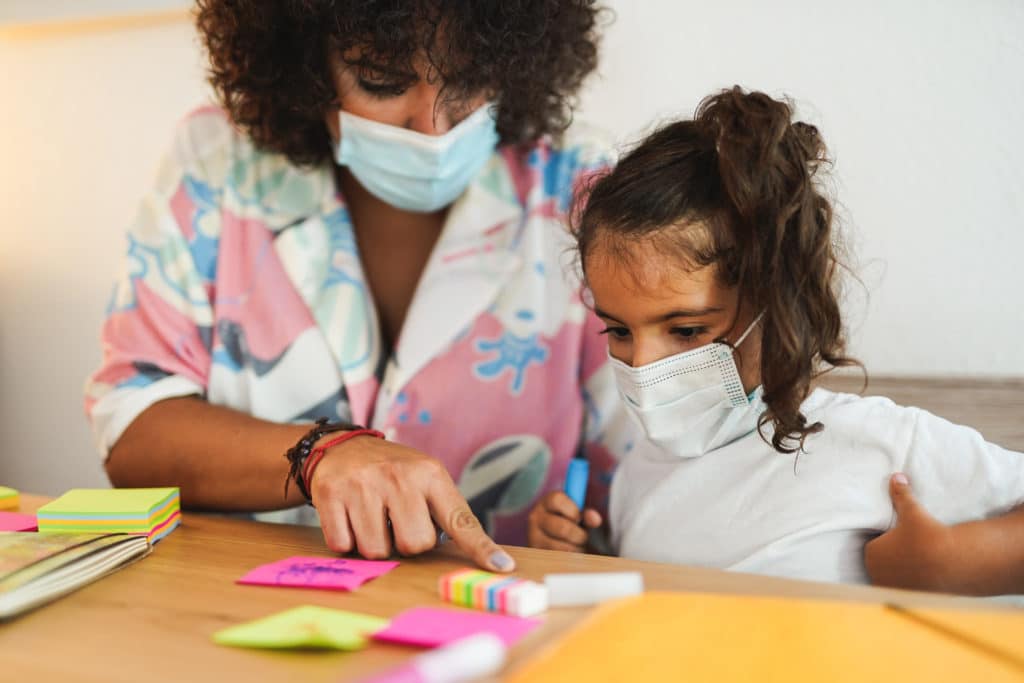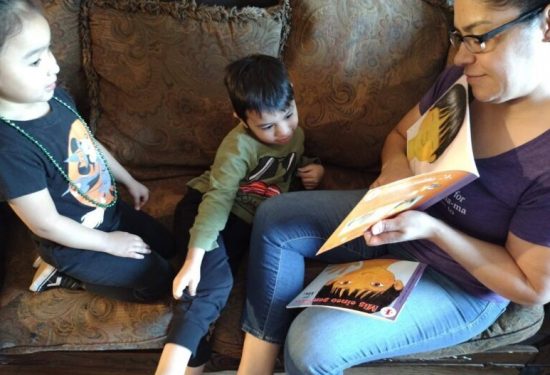The past year and a half of the pandemic has increased the strain on the home-based child care sector and many of the families they serve. Providers- both family, friend, and neighbor (FFN) and licensed Family Child Care (FCC)- took on more responsibilities due to COVID-19 while continuing to work throughout the peak of the pandemic. In addition to the stress of their everyday lives, providers had the added stress of caring for children during a dangerous time, while also taking care of themselves and their families. Since the pandemic started, there has been an increase of mental health issues with both adults and children. A group of pediatric health experts recently issued a declaration that we are facing a national state of emergency in children’s mental health and it is clear that both children and caregivers need more support.
La Red Latina de Educación Temprana, “La Red,” is a provider-led organization working to provide this support. La Red is a community-created model and intermediary organization serving 220 Latinx FFN providers, including undocumented and mixed-status families living across the Twin Cities region in Minnesota. For the past five years, the leader of La Red, Ruth Evangelista, and her team have been working with FFN providers, parents, and children to help spread awareness about mental health and how to take care of each other. We asked Ms. Evangelista to talk a bit about her experience and this project serving one of the most underserved communities in her home state of Minnesota.
La Red first started work around mental health five years ago after hearing from parents and FFN providers asking for assistance caring for children who may have emotional difficulties. Access to mental health services that are available in Spanish was difficult to find in their community. Evangelista, a mental health advocate and FFN provider, has spent much of her career learning the tools to assist those who may be dealing with their own mental health issues. She has received multiple certifications such as the Mental Health First Aid certification, she is trained in Conscience Discipline, and has received the Psychological First Aid diploma for Migrants, Refugees and Displaced Persons: “Transnational Solidarity Networks” from the University of California, Berkeley.
To serve their Spanish-speaking community, Evangelista and her team set out to find someone who could create appropriate resources in Spanish. After a lengthy search, La Red partnered with a therapist who helped them to create resources such as recognizing trauma and its effects on the brain, the importance of healthy attachments and techniques that reinforce it, and create training in Spanish on topics such as how to recognize issues related to mental health. During this time, the therapist was able to answer frequently asked questions such as why kids behave differently at home with their parents than at the child care program. By creating these resources, both parents and providers were able to use these tools in their homes to provide better support to their children.
At the start of the pandemic in 2020, community needs shifted. While the well-being of children remained a priority, the team at La Red saw the impact that COVID-19 was having on the mental health of not only the children but also on their parents and providers. National survey data supports this: in a recent poll half of all households report that at least one member of their household is struggling with depression, anxiety, sleep issues, or stress. A survey from July 2021 found that 43.8% of FFN caregivers experienced material hardship, which increased their emotional distress. La Red recognized a need to support and educate parents and providers on how to take care of themselves during the pandemic, including their physical and mental health. In addition to health and safety concerns related to the pandemic, many providers and families, mostly immigrants, faced the challenge of not being able to see their families in their countries of origin. A large number of community members experienced symptoms of depression due to the lack of contact with their families. These challenges were compounded by the caregivers’ lack of access to government-funded relief measures and supports. Many FFN caregivers are legally exempt from licensing, meaning they are operating legally but also are shut out of supporting child care systems.
La Red recognized this need and responded by creating resources on how to handle one’s own anxiety, how to assist children with mental health issues, and how to engage adults and children in activities together. La Red’s training for providers on how to handle anxiety was key. La Red provided all of the FFN providers tools to help handle their own anxieties, such as stress balls, training videos on utilizing yoga to manage stress, and providing resources in Spanish. Evangelista was able to help parents and providers understand technology better, a key challenge within the Latinx community thus enabling them to not only access additional resources but also to connect with family members in their home countries. Recognizing that much of the stress was driven by economic hardship, La Red was also able to assist in food distribution as well as provide cleaning supplies for families and toys for children.
La Red’s work to address mental health is particularly noteworthy given the cultural context: within the Latinx community, mental health is often a taboo topic. With more information coming out about the importance of mental health, many people are opening up to learning more about the subject. However, sharing new information can have its own challenges. The team at La Red was able to approach the subject of mental health with providers and parents by asking the simple question “what is mental health for you?” By asking this, Evangelista states “We learned that there is a lack of understanding of what mental health is and through this, we were able to teach our community about expressing feelings, why it’s important to cry and laugh, and why releasing emotions are important. By asking that question, we were able to understand what each individual knows and go from there.” La Red’s work gave parents and providers the opportunity to learn more about the topic of mental health and strategies to identify concerns or cope with challenging situations. By learning these important tools and concepts, providers and parents were able to provide better support for their children.
Over the past five years, Evangelista and her team have been able to make huge changes within their community and learn many lessons along the way. Evangelista states that “tolerance, patience, and understanding has been the biggest lesson. Everyone expresses their situations differently, and being able to see that is one of the most important things.”
As for the future, Evangelista and her leadership team at La Red are embarking on a training course from the University of Mexico. They are specializing in the mental health of children so they can provide better support and also share this information with their providers and parents. They also want to use this information to empower and better support the FFN community which continues growing in Minnesota.
The pandemic has illustrated the need to normalize discussions of mental health. By acknowledging the importance of mental health, Ruth Evangelista and her team are not only changing lives but also saving them.
Additional reading:
Home Grown: Comprehensive Services in Home-Based Child Care Networks: Meeting the Diverse Needs of Children and Families
Le, L. T., Lavin, K., Aquino, A. K., Shivers, E. M., Perry, D. F., & Horen, N. M. (2018). What’s Working? A Study of the Intersection of Family, Friend, and Neighbor Networks and Early Childhood Mental Health Consultation: Summary of Key Findings. Washington, DC: Georgetown University Center for Child and Human Development.National Center on Early Childhood Quality Assurance: Child Care Health and Well-Being



